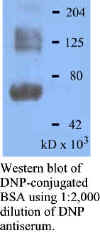英文名称: Polyclonal Dinitrophenol Antiserum
Tissues are continually exposed to reactive oxygen species (ROS) that are produced in tissues from metabolism processes or the inflammatory response of leukocytes or macrophages. It is estimated that as much as 1% of consumed oxygen may be converted to ROS, which can cause damage to various cellular components. Proteins are one of the cellular components most vulnerable to oxidative damage by ROS, which results in an increase in protein carbonyl content. This oxidative modification of proteins can lead to cross-linking, peptide fragmentation, modified residues and the conversion of one amino group to another. If sufficient protein damage accumulates, cell death will occur.
Oxidative damage to proteins has been shown to result in an increased protein turnover and decreased enzymatic activity and has been associated with a number of disease states including emphysema, arteriosclerosis and neurological disease. Oxidized proteins appear to accumulate with age and may represent 30-50% of the total proteins in aged cells. In Alzheimer’s disease, oxidative damage has been shown to occur at the site of neurodegeneration.
Measurement of these carbonyl groups on proteins is a good indication of the extent of oxidative damage to proteins. Dinitrophenylhydrazine (DNPH) will react with free carbonyl groups on proteins leading to adduction of the dinitrophenyl (DNP) group to the carbonyl group. Using an antibody to DNP, it is possible to visualize and localize the sites of oxidative damage by immunodetection of DNP adduction resulting from reaction of the tissue with DNPH.
A goat antiserum to dinitrophenol is currently available. This antiserum has been shown to be immunoreactive with DNP-modified bovine serum albumin by ELISA as well as by western blot. This antibody should be a valuable tool for scientists working to understand the role of carbonyl-modified proteins in Alzheimer’s disease, in addition to both normal and diseased states.
been shown to be immunoreactive with DNP-modified bovine serum albumin by ELISA as well as by western blot. This antibody should be a valuable tool for scientists working to understand the role of carbonyl-modified proteins in Alzheimer’s disease, in addition to both normal and diseased states.
Manufacturing Reference:
Southwest Immunology, Inc., unpublished results.